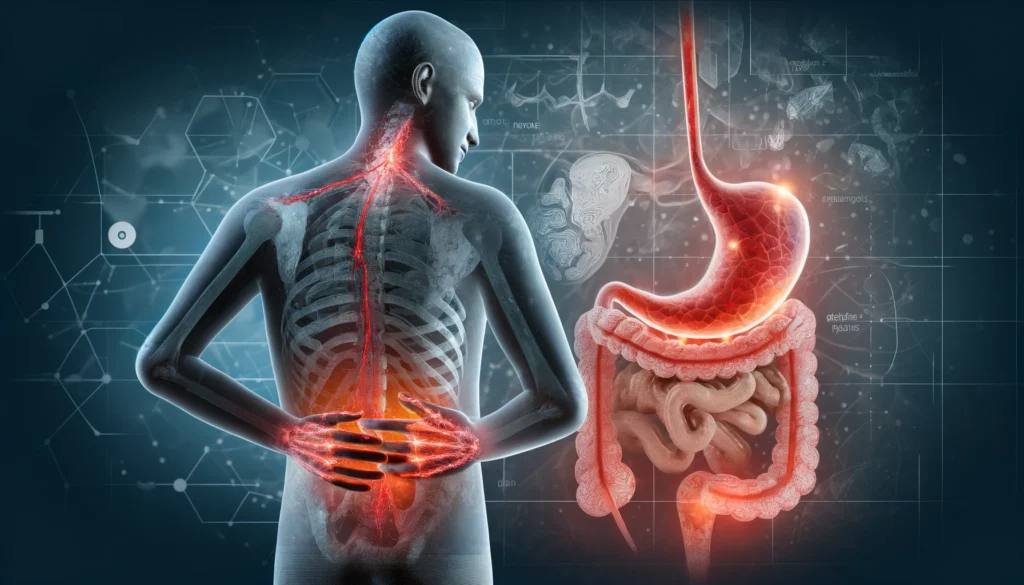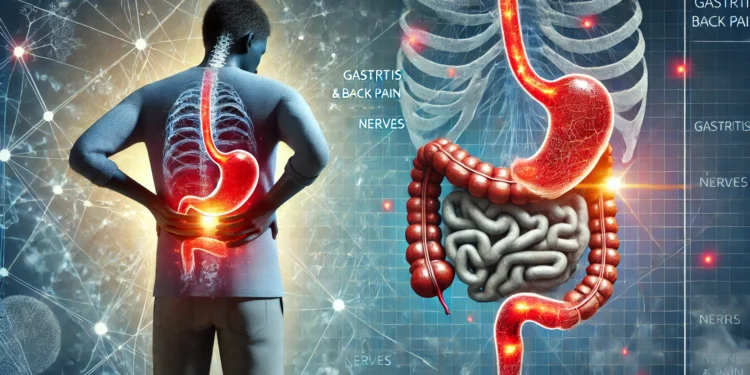Gastritis, a condition that causes inflammation of the stomach lining, is often associated with symptoms like stomach pain, nausea, and bloating. However, many people wonder, can gastritis cause back pain? The answer might surprise you. While back pain is not one of the most commonly reported symptoms of gastritis, there are several ways in which this digestive condition could lead to discomfort in your back. In this article, we’ll explore the potential link between gastritis and back pain, how they might be related, and what you can do to manage both conditions.
What is Gastritis?
Gastritis refers to the inflammation of the lining of the stomach, which can occur due to various causes such as infections, excessive alcohol consumption, chronic use of nonsteroidal anti-inflammatory drugs (NSAIDs), or stress. It can be acute (short-term) or chronic (long-term), and symptoms may include:
- Stomach pain or discomfort
- Nausea and vomiting
- Bloating or feeling full after eating
- Indigestion or heartburn
While these are the primary symptoms, some individuals with gastritis may experience discomfort in other areas of the body, including the back.
Can Gastritis Cause Back Pain?

Though gastritis typically causes pain in the upper abdomen, it’s possible for the pain to radiate or be referred to the back. Here are a few ways gastritis can be connected to back pain:
Referred Pain
Referred pain occurs when pain is felt in a location different from the source of the problem. In the case of gastritis, the irritation or inflammation in the stomach lining can sometimes lead to pain in the back, especially in the upper or middle regions. The nerves in the stomach and back are closely linked, so inflammation in the stomach can trigger sensations in the back.
Acid Reflux and Esophageal Irritation
Gastritis often coexists with acid reflux, a condition in which stomach acid moves up into the esophagus. This can cause a burning sensation in the chest and discomfort that can sometimes radiate to the upper back. While acid reflux is the more direct cause of back pain in this scenario, it’s often a companion condition to gastritis, making back pain more likely.
Posture-Related Discomfort
Chronic stomach issues like gastritis can make it difficult to maintain proper posture, especially if you’re trying to relieve stomach discomfort by slouching or leaning forward. Poor posture can lead to muscle strain in the upper or lower back, which could be mistaken for back pain caused directly by gastritis.
Chronic Stress and Tension
Stress is a known contributor to both gastritis and back pain. High levels of stress can lead to the development or exacerbation of gastritis and also contribute to tension in the muscles of the back. This muscle tension can cause pain and discomfort in the back, particularly if stress is long-lasting and unmanaged.
How Can You Tell If Gastritis Is Causing Your Back Pain?
Distinguishing whether your back pain is caused by gastritis or another condition can be challenging. However, there are a few clues that might help you identify the connection:
- Timing of the Pain: If your back pain occurs shortly after eating or when you feel stomach discomfort, it could be related to your gastritis. Gastritis pain is often aggravated by eating certain foods, and if the pain in your back follows this pattern, it may be linked.
- Location of the Pain: Gastritis-related back pain is typically felt in the upper or middle back, as this is where the stomach is located. If the pain is lower down, it may be more likely due to a musculoskeletal issue.
- Presence of Other Symptoms: If you experience common gastritis symptoms like nausea, bloating, or indigestion alongside your back pain, there may be a connection between the two. Additionally, if you have a history of stomach issues, the likelihood that gastritis is the cause of your back pain increases.
Treatment for Gastritis and Back Pain
If you suspect that gastritis is causing your back pain, it’s important to address both the digestive and musculoskeletal components of the problem. Here are some steps you can take to manage both conditions:
Treat the Gastritis
To reduce the inflammation and irritation in your stomach, it’s essential to treat the underlying gastritis. Your healthcare provider may recommend:
- Medications: Antacids, proton pump inhibitors (PPIs), or H2 blockers can help reduce stomach acid and promote healing.
- Dietary Changes: Avoiding spicy, fatty, or acidic foods can help reduce irritation. Eating smaller meals more frequently can also prevent excess stomach acid production.
- Avoid Irritants: Limit alcohol and caffeine, and refrain from taking NSAIDs unless prescribed by your doctor.
Manage Stress
If stress is contributing to both your gastritis and back pain, practicing stress-reducing techniques is crucial. Meditation, deep breathing exercises, yoga, or regular physical activity can help alleviate tension in both your stomach and back.
Improve Posture
Maintaining proper posture while sitting, standing, and sleeping can reduce strain on your back muscles. Ergonomic chairs, proper workstation setups, and supportive mattresses are all important for minimizing back pain.
Physical Therapy for Back Pain
If your back pain persists, physical therapy can help improve posture, strengthen muscles, and provide relief from tension. A physical therapist can guide you through exercises specifically designed to alleviate back pain caused by poor posture or muscle tension.
Pain Management
Over-the-counter pain relievers, such as acetaminophen or ibuprofen, may provide temporary relief for back pain. However, it’s important to avoid NSAIDs if you have gastritis, as they can further irritate the stomach lining. Always consult your doctor before taking any medication.
When to See a Doctor
If your back pain persists or if you experience severe stomach symptoms such as vomiting, blood in your stool, or unexplained weight loss, it’s crucial to see a healthcare provider. These could be signs of more serious conditions that need immediate medical attention.
FAQs:
1. Can gastritis cause lower back pain?
While gastritis typically causes upper or middle back pain, it can indirectly contribute to lower back discomfort due to poor posture or muscle tension.
2. How can gastritis lead to back pain?
Gastritis can lead to back pain through referred pain from the stomach, acid reflux affecting the esophagus, or muscle strain caused by stress or poor posture.
3. What are the common symptoms of gastritis?
Common symptoms include stomach pain, bloating, nausea, indigestion, and sometimes back pain.
4. How do you treat back pain caused by gastritis?
Treat gastritis with medications and dietary changes, and manage back pain through proper posture, stress management, and physical therapy.
5. When should I see a doctor for gastritis and back pain?
See a doctor if your pain is severe, persists, or is accompanied by symptoms like vomiting, blood in your stool, or unexplained weight loss.
Conclusion:
While gastritis causing back pain isn’t the most common association, there are several ways the two conditions can be connected. Whether through referred pain, acid reflux, poor posture, or stress, gastritis can contribute to discomfort in your back. By treating both the underlying gastritis and the symptoms of back pain, you can improve your quality of life and find relief from both conditions. Always consult with a healthcare provider for a proper diagnosis and personalized treatment plan.
Read More Relevant Article:
- Read Also: Upper Back Pain Spiritual Meaning – What Upper Back Pain Reveals on a Spiritual Level!
- Read Also: Albuquerque Neck And Back Pain – Exploring Neck and Back Pain Solutions for Albuquerque Residents!
- Read Also: What Will They Do In The Emergency Room For Severe Back Pain – How Will Emergency Room Doctors Treat Severe Back Pain!











